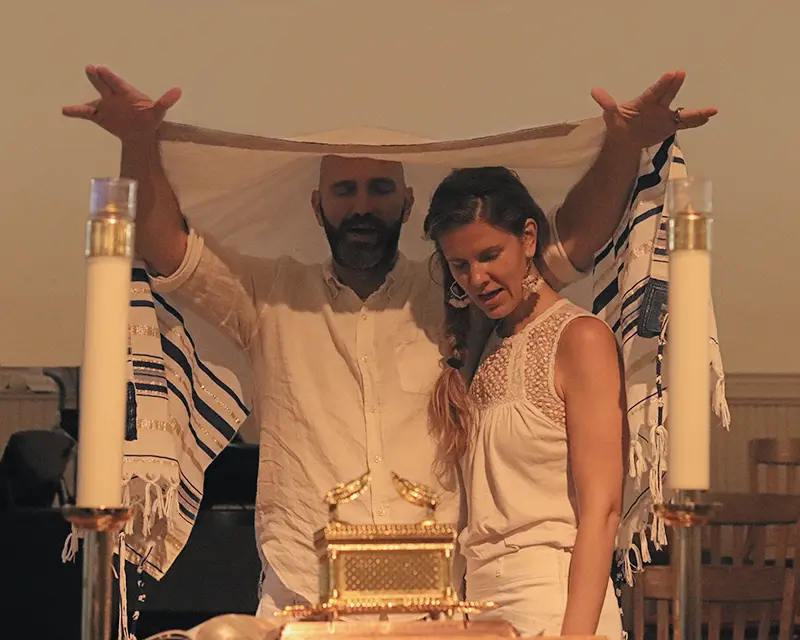Technically speaking, Messianics are always ethnically Jewish, whereas a Hebrew Christian may be of any ethnicity. We acknowledge that we who were Gentiles have been grafted into Israel (Romans 11:16-24) by faith and covenant, and have become part of the Commonwealth of the tribes of Israel (Ephesians 2:12-14).
Most Messianics believe that the laws God proclaimed through Moses—save perhaps 9/10ths of the Ten Commandments—apply only to Israelites. In contrast, we Hebrew Christians argue that there is one Law for both Jew and Gentile (Deuteronomy 31:12; 29:11-12; Leviticus 24:22; Exodus 12:49). We teach that everyone who reveres the Lord should uphold the Law insofar as it is possible. Motivated by gratefulness and love, we strive to be law-abiding citizens of God’s Kingdom. This is not legalism, but obedience in pursuit of holiness (Romans 3:31; 7:12,22; 1 Peter 1:14-16).

Recall the story of Ruth, a woman of Moab—a Gentile. She dissociated herself from her identity as a Gentile, and became a “God-fearer” who sojourned with Israel, declaring, “For where you go I will go, and where you lodge I will lodge. Your people shall be my people, and your God my God” (Ruth 1:16). But then she went further and married Boaz, a native-born Israelite from the tribe of Judah. From that moment forward, Ruth was a Judean, a.k.a. a Jew. Never again was she considered a foreigner.

The story of Ruth, while real history, is also a prophetic word-picture. God used those events to foretell what would happen between his son, Yeshua (a Jew), and the Gentiles who would embrace him. The story even refers to Boaz and Ruth’s “redeemer” who “shall be to you a restorer of life” (Ruth 4:14-15). What an amazing analogue!
In that same vein, the apostle Paul wrote,
“Therefore remember that at one time you Gentiles in the flesh… were at that time separated from Christ, alienated from the commonwealth of Israel and strangers to the covenants of promise, having no hope and without God in the world. But now in Christ Jesus you who once were far off have been brought near by the blood of Christ” (Ephesians 2:11-13).
Did you catch that? Paul said that believing Gentiles were once foreigners to God and Israel, but are no longer strangers—they’ve been assimilated. So why do non-Israelite Christians still think of themselves as Gentiles? They shouldn’t, just as Ruth stopped thinking of herself as a Moabite, and no longer followed the practices of Moabites.
We see this play out in the Book of Acts. Cornelius, a God-fearing Gentile, received a supernatural message to talk to Peter. When the apostle Peter visited him, this is what happened:
“So Peter opened his mouth and said: ‘Truly I understand that God shows no partiality, but in every nation anyone who fears him and does what is right is acceptable to him… About [Yeshua] all the prophets bear witness that everyone who believes in him receives forgiveness of sins through his name.’ While Peter was still saying these things, the Holy Spirit fell on all who heard the word. And the believers from among the circumcised who had come with Peter were amazed, because the gift of the Holy Spirit was poured out even on the Gentiles. For they were hearing them speaking in tongues and extolling God. Then Peter declared, ‘Can anyone withhold water for baptizing these people, who have received the Holy Spirit just as we have?’ And he commanded them to be baptized in the name of Yeshua the Messiah” (Acts 10:34-48).
Cornelius and his household had an identity crisis: Romans who worshiped the God of Israel. That’s quite a dichotomy. But, in a flash, Yahweh changed their identity through the work of the Redeemer. They became the same as the Jewish Israelites who brought them the Good News.

From Genesis to Revelation, the inherent Hebraic character of the scriptures is evident. Sadly, most of the Hebrew elements from the Book of Acts onward have been downplayed or erased through bad interpretation. The correct information is still there, but one must look carefully without using a Roman or modern lens.
One important section to examine is Acts 15, which details the first Messianic council. The Jewish elders at that council concluded that circumcision was not a requirement of salvation. All well and good, but what about sanctification? Were the new Gentile converts expected to become set-apart by obeying God’s instructions for holy living?
Yeshua’s brother, James, leader of the Jerusalem Assembly, closed the meeting with an important decision. He declared that converts should not be immediately burdened with any more than four crucial rules, three of which were “Old Testament” food laws. (Take note that none of these are obvious in light of the Great Commandment to love God and our neighbors.)
James went on to point out that “from ancient generations Moses has had in every city those who proclaim him, for he is read every Sabbath in the synagogues” (Acts 15:21). Meaning: the converts can learn more of the laws of God by attending synagogue every Saturday. Is your mind blown? It probably should be. Why was this never taught from church pulpits?

Most Christians denominations teach that the Mosaic Law was done away with because it was part of a prior covenant no longer in force. However, that interpretation falls apart when confronted with many passages in the Gospels and the Book of Acts. Here’s a sampling of such passages to consider:
Luke Abaffy
What you’ve read here is just the tip of the iceberg. If you’d like to go deeper, please start with the following video, which gives an overview of the congregation’s devotional series, Reformation 2.0: Escaping Romanized Christianity.